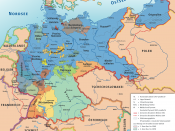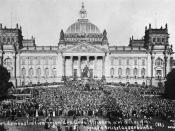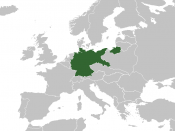Hitler, and his Nazi parties rise to power was one of chance and circumstance. His alternative views struck a chord with the people; he was able to channel Germany's hatred for the Weimar Republic, Treaty of Versailles and minority groups into support for his National Socialist Party. Hitler was a powerful orator capable of winning entire audiences to his views and ideologies. Hitler was able to manipulate the truth to gain widespread popularity. He controlled power by installing fear and sustained a myth about his leadership fuelled by propaganda.
Hitler's initial attempt at gaining power via revolution in Bavaria in 1919 was a fiasco. Resulting in his brief imprisonment, he was able to gain national prominence through the Medias attention of his Beerhall Putsch, and while imprisoned wrote "Mein Kampf" in which Hitler listed his ideological views and received some new support.
The Treaty of Versailles signed by the Germans in 1919, while leaving the Germans feeling betrayed did nothing did nothing for the popularity of the Nazi Party in the short-term as between 1918 and 1928 the Nazi's failed to gain a seat in the Reichstag.
However, the long-term repercussions of the treaty helped the Nazi's gain appeal as by the late Twenties, Germany had suffered the worse effects of the Depression more so than any other country due to treaty's callous terms. Specifically, it was the presence of excessive reparation demands that left the German economy venerable; and the inclusion of the 'War Guilt Clause'. Hitler learned to exploit the nation's resentment by asserting that he would abrogate the terms of the Treaty. Thus, although the Treaty played no direct part in Hitler's popularity early on, it did catalyse it in the long run.
The Weimar's ineffective government also contributed to the rise of Hitler because...



Very well done.
Clearly written, concise, with a number of historians providing additional weight with consideration given to historiography.
0 out of 0 people found this comment useful.